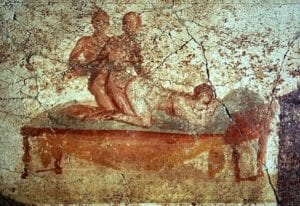 Weird Stuff
Weird Stuff  Weird Stuff
Weird Stuff  Movies and TV
Movies and TV 10 Weird Ways That TV Shows Were Censored
 Our World
Our World 10 Places with Geological Features That Shouldn’t Exist
 Crime
Crime 10 Dark Details of the “Bodies in the Barrels” Murders
 Animals
Animals The Animal Kingdom’s 10 Greatest Dance Moves
 Movies and TV
Movies and TV 10 Box Office Bombs That We Should Have Predicted in 2025
 History
History 10 Extreme Laws That Tried to Engineer Society
 History
History 10 “Modern” Problems with Surprising Historical Analogs
 Health
Health 10 Everyday Activities That Secretly Alter Consciousness
 History
History Top 10 Historical Disasters Caused by Someone Calling in Sick
 Weird Stuff
Weird Stuff 10 Wacky Conspiracy Theories You Will Need to Sit Down For
 Movies and TV
Movies and TV 10 Weird Ways That TV Shows Were Censored
 Our World
Our World 10 Places with Geological Features That Shouldn’t Exist
Who's Behind Listverse?

Jamie Frater
Head Editor
Jamie founded Listverse due to an insatiable desire to share fascinating, obscure, and bizarre facts. He has been a guest speaker on numerous national radio and television stations and is a five time published author.
More About Us Crime
Crime 10 Dark Details of the “Bodies in the Barrels” Murders
 Animals
Animals The Animal Kingdom’s 10 Greatest Dance Moves
 Movies and TV
Movies and TV 10 Box Office Bombs That We Should Have Predicted in 2025
 History
History 10 Extreme Laws That Tried to Engineer Society
 History
History 10 “Modern” Problems with Surprising Historical Analogs
 Health
Health 10 Everyday Activities That Secretly Alter Consciousness
 History
History Top 10 Historical Disasters Caused by Someone Calling in Sick
10 Crazy Sex Facts From Ancient Times
People always look to the past as a golden age. People were moral, the young were respectful, and sex was not everywhere. The fact is, though, that human nature never changes. If there have been periods where sex was less flaunted, then those were the rare lulls in the sexual storm that is history.
10Contraception

Childbirth before the invention of anesthetics and modern medicine was brutal, painful, and dangerous. Euripides has Medea in his play declare, “I had rather stand my ground three times among the shields than face a childbirth once.”
Is it any wonder then that women sought ways to avoid the horrors of the birthing bed? And sometimes, they might just like to have sex without the risk of dying. So, they turned to the best available products at the time.
We find a recipe preserved from 1800 BC for a pessary used to prevent pregnancy from ancient Egypt. Chopped crocodile dung is mixed with honey and salt and “sprinkled over the womb.” This might have created an effective spermicide, but it would definitely be a mood-killer.
The Roman and Greek worlds relied on a more pleasant method—so pleasant that they drove the source of their contraception to extinction. Apparently, silphium was a form of giant fennel used for almost any sickness or culinary recipe. It was so effective and delicious that it came to be worth its weight in silver. Alas, it was also impossible to cultivate and had to be gathered from the wild. The last stalk of silphium was seen during the reign of the emperor Nero. So, now we have to seek our salad and contraceptives in different aisles of the supermarket.
9 Pedico and the Courts

Most people know the Biblical cities near the Dead Sea as dens of depravity. Of course, I refer to Gomorrah and Sodom. And Sodom also gave its name to a class A felony. The locals were fond of the back-door sexual approach, and their predilection became known as sodomy. Their destruction—God was not pleased with them—was described in the Bible. But this did not stop people, especially the Romans, from continuing this popular Greek practice.
Sodomy, or pedico as the Romans called it, was enjoyed by women and men. Women for its contraceptive benefits as no pregnancies resulted from its use. The practice among men was more accepted as it lost its Biblical abomination status. So, where is the crazy part of this fact, you ask?
It lies in the courts! When it came to adultery, the law took the practice of pedico in another direction— the injured party could sodomize the guilty party. Or, if he chose a stand-in, with a large radish!
8Pederasty in Athens

If we were told a prominent figure in society found adolescents almost irresistible, we would be rightly appalled. When Plato tells us that the philosopher Socrates enjoyed hanging around naked youths, sleeping beside them, embracing them, his audience would not have shown the least surprise. In Athens of the fifth century BC, it was held as entirely natural that men would be attracted to boys. There are certainly plentiful literary and artistic records that show it was a common practice, at least among the upper classes.
The older man, the Erastes, was expected to court the boy, the Eramenos, with gifts and other devices. The relationship, once established, was supposed to be beneficial to both. The older man got sex, and the younger was introduced to Athenian society with a powerful protector. Sometimes, this relationship is portrayed as simply a May-December romance, but the boys involved were very young. It was considered shameful for anyone capable of growing a beard to still be an Eramenos.
7Brothels

In most societies, prostitution has been, if not illegal, then at least looked on as something deeply shameful. For the Romans, this was not the case. The Lupinar in the ruins of Pompeii gives us a peek into the world of the Roman brothel. Instead of hidden away in a dank alley, it proudly asserts the sort of business one could do inside. Graffiti tells people what to expect from the various women on offer. Once inside, several graphic images help those with less imagination or the illiterate understand just what they were buying.
Things were even more brazen in Babylon. According to the Greek historian Herodotus, at least once in her life, every Babylonian woman had to go to the temple of Ishtar and serve as a holy prostitute. No matter who offered them a coin, they had to accept his advances. Some researchers dispute that this happened, but there seems to be widespread agreement that service to God was the same as servicing men for money for some women.
6Ancient Sex Toys

In 2005, in Germany, archaeologists made a startling discovery. Eight inches of rock-hard matter protruded from the ground. While the size is impressive, so is the carving. This was a 26,000-year-old phallus that some researchers believe to be the earliest discovered dildo. While this is the oldest dildo discovered, it is by no means unique. Life-size penises have been discovered fashioned from all manner of material, even wood—which suggests our ancestors were braver about splinters than we are today.
With their explicit pottery paintings, the Greeks also give another valuable peep into the world of the ancient sex toy. Women can be seen wielding dildos on many vases. Further, they were not coy about them, at least in comic scenes. The writer Herodas produced a mime based on a conversation between two women, one seeking to find who made the other their wonderful leather dildo (read it here). The dildo maker hides his true business behind the more family-friendly image of being a cobbler. In Aristophanes’s play Lysistrata, the women of Greece go on a sex strike to end a war, in part because it has disrupted the trade in dildos.
5Pantomime Actor’s Phallic Antics

Speaking of Greek plays, Greek tragedies have a reputation for being bloody affairs. They were also uniformly solemn. But at the end of a long day of hard-hitting drama, the Athenians liked to let out the tension with a laugh. Comedy and Satyr plays lightened the mood. And along with pointed political satire, one of the things they loved best was a good dick joke.
On stage, comic male characters would wear a huge and barely hidden leather penis. This could be whipped out as the play required for anything. The master of Old Comedy, Aristophanes, employed these phalluses for masturbation jokes, erection humor, impotence barbs, and the offer to use the phallus as a ship’s rudder. So if anyone ever tells you dick jokes are crude, you can quote from Aristophanes: “Peace, profane men! . . . come forward and . . . hold the phallus well upright.”
4Wandering Uterus

If someone accuses you of being hysterical, they accuse you of something quite specific and very odd. First described by the ancient Greek father of medicine, Hippocrates, hysteria was a disease of women with wide-ranging symptoms. Almost anything could be blamed on hysteria, but it was chiefly thought to contribute to a lack of emotional control. So, what causes hysteria? The uterus traveling around the body.
This today strikes us as a ludicrous idea. But in the ancient world, the uterus was thought of as a deeply troubling organ. Egyptian papyri carry descriptions of medicines designed to coax “a wandering uterus” back into place. Plato, one of the foundational thinkers of the Western tradition, thought of the uterus as an animal that caused mischief wherever it went in the body.
3Spartan Women

Sparta was in many ways an odd-one-out of Ancient Greece. While women in Athens were kept so secluded that they were thought to speak their own dialect, Sparta’s women received great freedom for the time. When the Spartan queen Gorgo was asked, “Why is it that you Spartan women are the only women that lord it over your men,” she said, “Because we are the only women that are mothers of men.”
But the wedding night could be a strange affair for a Spartan girl. Her hair would be shaved off, and she would be dressed in a man’s cloak and sandals. Thus dressed, she would wait in the dark for her husband to steal in and have his way with her. Some historians have suggested that his cross-dressing on the part of the bride was to get a man more used to spending time with his male brothers-in-arms used to the delights of heterosexuality.
2Penis Charms

The penis appeared everywhere in the ancient world. You could not walk the streets of ancient Athens or Rome without the risk of poking your eye out. In Athens, statues called Herms were ubiquitous. As a square pillar with the head of the god Hermes, they also feature erect phalluses. These penile protectors were thought so important that when in 415 BC, someone went on a drunken rampage and smashed the penises, it created a crisis in the state.
The penis was thought to possess Apotropaic power—it could ward off evil. It was painted on frescoes, carved in statues, cast in bronze, and generally daubed wherever people might wish to be safe. Often, the phallus is shown with wings, and sometimes these winged penises were hung with bells. These Tintinnabulae acted as both charming wind chimes and magical protectors.
1Egypt’s Incestuous Gods

Royal families have often tried to keep their bloodlines pure by marrying within small and closely related groups, often with disastrous genetic consequences. The Egyptian royal family often married brother to sister to keep it all in the family. This is not a good idea, but it becomes more understandable when you consider that the ancient pharaohs were seen as gods on Earth. And they were doing exactly the same as the gods in heaven. The most famous example of a brother-sister marriage in Egyptian mythology is that of Osiris and Isis.
When the god Osiris was killed and dismembered by his brother Set, his wife and sister Isis sought to gather up all his body parts. The only one she failed to recover was his penis—which a crocodile ate. Since the Nile had claimed the penis of a god, it became hugely fertile and brought life to the land. In the first mention in recorded history of a blow job, Isis fashioned a new penis out of clay for her brother-husband and blew life into it.








